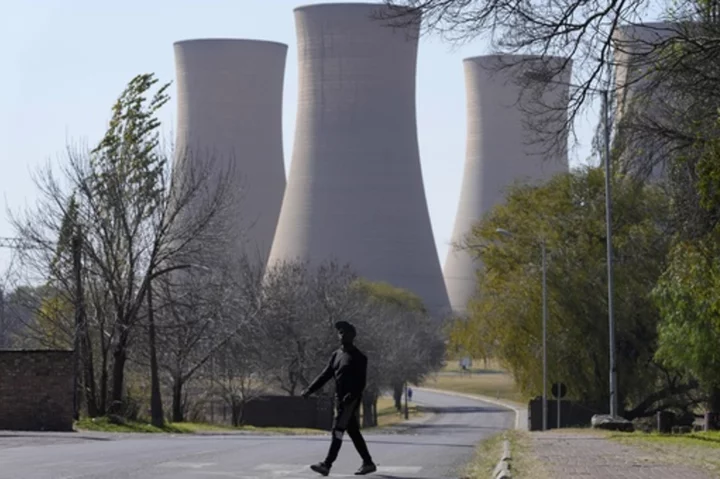PARIS (AP) — World leaders, heads of international organizations and activists are gathering in Paris for a two-day summit aimed at seeking better responses to tackle poverty and climate change issues by reshaping the global financial system.
Developing nations point to an outdated system where the United States, Europe, China and other big economies that have caused most climate damage are leaving the poorest countries to deal with the consequences.
The Paris talks also come as the COVID-19 pandemic, the war in Ukraine and a global debt crisis have led to a drop in life expectancy and an increase in poverty in most countries around the world, the United Nations Development Program reported.
French President Emmanuel Macron, who organized the summit, said the fight against poverty, efforts to curb global warming and the protection of biodiversity "are closely intertwined. We therefore need to agree together on the best means to address these challenges in the poor and emerging countries."
The Paris summit comes in the wake of a plan championed by Barbados Prime Minister Mia Mottley to ease access to financing for climate-vulnerable countries. Mottley and other proponents have argued that developing countries are forced to pay such high interest rates that they struggle to finance adaptation projects, like sea walls, or green energy initiatives, like large solar farms, or simply make payments on outstanding loans when climate-infused disasters strike.
Activists fear the talks won’t meet expectations.
“The current financial system does not just need a bandage, it needs an intensive surgical intervention,” said Harjeet Singh, head of global political strategy at Climate Action Network International.
“There are some good ideas on the table,” he noted, “but I must mention that they don’t really go far enough.”
The Paris summit has no mandate to make formal decisions, French organizers stressed, but it aims at giving a strong political impetus to key issues to be discussed in upcoming climate conferences and other international meetings.
“We demand cancellation of debt. We demand public finance for climate action, particularly adaptation. And addressing the loss and damage,” Singh said, referring to the issue of polluters paying for their climate impacts.
Climate activists and developing nations also urge rich countries to deliver on their existing commitments.
Experts are expected to announce Thursday that the pledge to provide poor nations with $100 billion in aid each year to tackle global change is estimated to be met for the first time this year. First made in 2009 and reaffirmed at the 2015 Paris climate summit, the promise had never been fulfilled
Amid key topics to be discussed are changes needed in the way the World Bank and the International Monetary Fund are lending and granting money to the most vulnerable countries. Both institutions have been criticized for not factoring climate change into lending decisions and being dominated by wealthy countries like the U.S.
Summit participants are expected to back a tax on the greenhouse gas emissions produced from international shipping, with the aim to enable its adoption at a July meeting of the International Maritime Organization.
To bring more money in, activists are pushing for a tax on the fossil fuel industry and another one on financial transactions — two proposals that appear to have little support from wealthier nations.
Debt restructuring and cancellation are also to be debated, as a growing number of countries are struggling with unsustainable debt aggravated by climate change issues.
Participants are to discuss a debt suspension clause for countries hit by extreme climatic events. Yet it would have no impact on existing debt, activists note.
Cécile Duflot, Oxfam France general director, said there’s a “historic, political responsibility” from wealthy nations and a “duty of solidarity” towards poorest countries.
“We advocate for radical measures … because they are the only ones that are in line with the extent of the problem,” she said.
Climate activists staged a demonstration Wednesday near the Eiffel Tower with a banner saying “End fossil finance” and “Make polluters pay."
Filipino climate justice activist Mitzi Jonelle Tan said “my country is one of the most climate-vulnerable countries in the world and we are experiencing this climate impact every single day. And yet we are expected, our generation and our countries, to go into debt … because most of climate finance is in the form of loans. We are saying: enough!”
Forty heads of state and government are slated to attend the summit, many from poor and climate-vulnerable nations. Only two are members of the Group of Seven most developed countries — Macron and German Chancellor Olaf Scholz. The U.S. is represented by Treasury Secretary Janet Yellen and climate envoy John Kerry.
Attendees include China’s Prime Minister Li Qiang, Brazil’s President Luiz Inácio Lula da Silva, European Commission President Ursula von der Leyen, United Nations Secretary General Antonio Guterres, World Bank head Ajay Banga and IMF President Kristalina Georgieva.
Climate activists Greta Thunberg and Vanessa Nakate also are set to attend.
___
AP journalist Oleg Cetinic in Paris contributed to the story.
___
Associated Press climate and environmental coverage receives support from several private foundations. See more about AP’s climate initiative here. The AP is solely responsible for all content.

